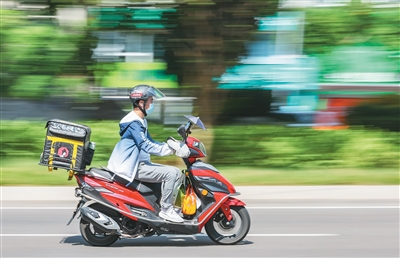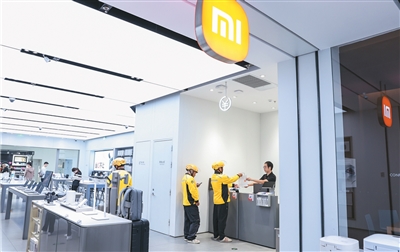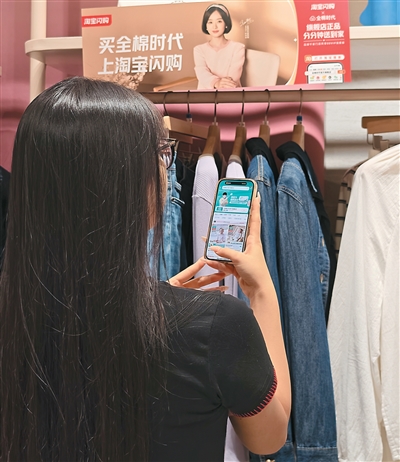How long does it usually take to receive an online order? With instant retail, delivery typically takes just 20 to 30 minutes.
Today, e-commerce platforms are expanding their instant retail services to meet consumers' growing demand for fast and convenient shopping. According to a 2024 report on instant retail development released by the Chinese Academy of International Trade and Economic Cooperation under the Ministry of Commerce, China's instant retail market is expected to exceed 2 trillion yuan (about $ 280.66 billion) by 2030, showing strong growth potential.
A man surnamed Zheng, a resident of Chaoyang district in Beijing, recently experienced the convenience offered by instant retail. When a small indicator light on one of his appliances broke, he decided to buy a mini electric soldering pen to fix it. Unsure where to find one, he searched on a food delivery app and was surprised to see several nearby stores had it in stock. He placed an order, and within 30 minutes, the soldering pen arrived at his doorstep.

A deliveryman is on his way to deliver packages in Yubei district, southwest China's Chongqing Municipality, on Oct. 1, 2025. (Xinhua/Huang Wei)
Zheng couldn't help but wonder where these stores came from. He had never seen them in his neighborhood, yet they seemed to have everything.
The stores that are only available on delivery platforms are a key part of how instant retail works. They are known as front-end warehouses. One major advantage of front-end warehouses is that they can offer a more diverse range of products tailored to specific customer needs.
Many of the warehouses stock as many as 15,000 SKUs (stock keeping units), comparable to a supermarket, said Hu Qiugen, head of retail at Taobao Instant Commerce under Chinese e-commerce giant Alibaba. By keeping inventory close to consumers and leveraging an instant delivery network, they can respond quickly to customer demands.
The front-warehouse distribution model allows products to be shipped from the nearest warehouse, ensuring quick delivery as soon as an order is placed.
A similar instant retail service provided by e-commerce platform Meituan aims to deliver products to consumers' doorsteps within 30 minutes. "This is made possible by the growing density of front-end warehouses," said Wang Kai, an instant retail research fellow at Meituan Research Institute.

Delivery personnel collect items from a store to fulfill instant retail orders. (Photo courtesy of the interviewee)
Wang said that each warehouse typically serves customers within a 3-to-5-kilometer radius. By the second quarter of this year, Meituan, together with various retailers and brands, had built over 50,000 warehouses for the instant retail service across the country. The number is expected to reach 100,000 by 2027.
Instant retail is in a period of explosive growth, with its scale expanding steadily. Major e-commerce platforms have launched their own instant retail brands, and beyond building front-end warehouses, they are increasingly connecting with local brick-and-mortar businesses.
Industry insiders pointed out that instant retail is transforming the traditional e-commerce model from being product-centered to service-centered. It helps integrate online and offline consumption, empowers local retailers to leverage their strengths, and boosts sales for physical stores.
Liu Tao, chief operating officer of Beijing Shuntianfu Commercial and Trade Co., Ltd., which operates the Sun Mart supermarket chain in Beijing, said the stores mainly sell fresh produce and daily essentials, with middle-aged and elderly shoppers making up the core customer base.
Since joining Taobao Instant Commerce in May, the 11 Sun Mart supermarkets have seen their average daily orders surge, with online sales repeatedly doubling.

An apparel store joins an instant retail platform. (Photo courtesy of the interviewee)
"What's most valuable is that instant retail brings in a large number of younger customers—those born in the 1990s and 2000s—which is crucial for the brand," said Liu. Today, about 90 percent of the Sun Mart supermarkets' prepackaged goods can be ordered online.
The 2024 report on instant retail development pointed out that the product structure for instant retail is becoming more comprehensive, moving toward full-category coverage. The main product categories include snacks, beverages, fruits and vegetables, meat, eggs, dairy, grains, and cooking staples. Meanwhile, categories such as electronics, baby products, beauty, healthcare, pet supplies, and apparel are showing fast growth.
More and more brands are joining instant retail platforms, giving consumers a wider range of choices.
Wang said the instant retail service of Meituan has made remarkable progress in expanding its product selection in recent years. The entry of major brands such as Huawei, Xiaomi, Midea, Decathlon, and MINISO has driven strong growth in categories like electronics and everyday household goods.
(Source: People's Daily)
